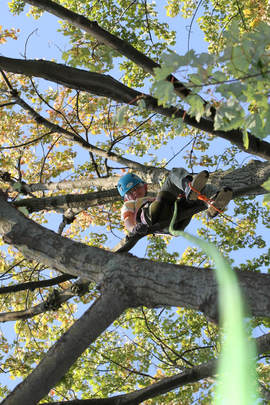 The confidence you have in yourself has a major impact on your level of happiness through life. When I am lacking in confidence as I take on a new task, I find myself immobilized by fear, uncertainty, and feelings of anxiety. My mind says things like, "I can't", "I don't know how", and "I haven't done this before". The view forward is obscured and the task appears overwhelming. Have you experienced this? Have you seen it in your children? Confidence plays an important role in everybody’s life. A person's level of self-confidence is directly related to the level of success they can achieve in pursuit of their life goals. Fortunately, as it is with most skills, we can maintain and build confidence through regular practice. Rock climbing and climbing trees are not only hobbies I enjoy, they provide opportunities for me to build confidence in my abilities. Working through the challenges I face in these hobbies can either build or diminish my level of confidence. Since tree climbing is a hobby I share with others, it provides me the additional perspective of watching others work through their own challenges. In working with many climbers through the years, I have noticed three important steps in building confidence: overcome self-doubt, split a large goal into a series of smaller goals, and focus attention inward. Overcoming Self Doubt "Whether you think you can or think you can't, you are right." Negative self-talk is the first thing that must go. As the case with most challenges, if you are to have any chance at successfully climbing to the top of the tree you will need to overcome self-doubt. This doubt tends to be triggered by fear. Each of us has our own fears to work through. Fear of heights. Fear of embarrassment. Fear of failure. Brand new experiences can be scary. For those facing and working through a fear, self-doubt creates an obstacle. Simply taking the initiative to try something new may be enough to help you overcome your fear. That first step might give you a boost in your confidence. Pair that with a little know-how and you are better able to pursue your goal for the day. My role as a facilitator is to aid you on your journey to reaching your goal. I can show you the technique yet I cannot climb the tree for you. Once you are on rope, my words are all I have to help you. More often than not, they are more than enough if I use them to convey positive thoughts and encouragement. Our fears express themselves in the words we use. This means that the words you use have a profound impact on how well you will perform. "I can't" seems to be the most common and inhibiting phrase I hear people say. These words are typically uttered within one minute of trying to climb; which leads me to believe they are spoken more out of reflex or conditioning. A coach or facilitator can help present a positive environment, but your self-talk often has the biggest impact. In order to move forward, we must stop the negative self-talk. We can replace it with positive words like, "I can do this" and "I am doing it." Speaking and thinking positive words and thoughts instills confidence. Building on a Series of Smaller Goals "What would you attempt to do if you knew you could not fail?" Sometimes our goal is so lofty that we have no idea how to achieve it or even where to begin. In order to reach the goal, we will need to break it down into smaller steps. There are many reasons why this approach leads to success, but I think a primary driver is that it allows us to realize successes at each step. With a small boost in confidence at each step, we are energized and ready to take the next step. With each successive step our confidence continues to grow. When Thomas came to climb with us his first time, his sight was set on climbing to the top of the tree. He came with confidence. As he began to ascend, his focus appeared to be strictly on reaching the top. Focused on that goal, he began to struggle because he tried to skip some of the steps involved in the climbing technique. The sit-stand technique is the foundation of the climbing method. Given his struggle, he naturally resorted to trying alternative methods like pulling with his arms and kicking his legs out. When he realized he was still not getting higher, his frustration began to build and his confidence plummeted. When trying to help a person build confidence, they must be allowed to work on their challenges. Personal growth happens through personal experiences of trial and error. Constantly telling a person how to do something or doing it for them robs them of these invaluable lessons. By having Thomas turn his attention back to the basic steps in the climbing technique, he was able to focus on the fundamentals needed to ascend. The steps necessary to reach his overall goal. With his focus back on using his legs versus his arms, he began to regain some of his confidence. After repeating the process a few times, he realized that he had ascended to 15 feet on his own. In a short period of time, his smaller goal of reaching the first branch was achieved. After a short break to acclimate himself to the height he had climbed (it feels a lot higher when you are looking back down at the ground!), he proceeded to climb higher. Eventually, his ultimate goal was only a few feet away. Thomas' goal of climbing to the top was unachievable until he broke it down into smaller attainable steps. With each success, his confidence grew. With each boost to his confidence, he was prepared to take on the next challenge. Gradually, his ultimate goal came into focus. Do Not Compare Yourself to Others "It doesn't matter what others are doing. It matters what you are doing." Building confidence in yourself has nothing to do with other people. Confidence is understanding and knowing what you are good at or the value you provide. In order to build confidence, you must be focused on yourself and your own experience. When Thomas began to struggle, his frustration was further compounded when he noticed that others were higher than him. He lost confidence when he viewed his slower performance compared to the others as a reflection on his ability to succeed. His ability to climb had absolutely nothing to do with how well the other climbers did. Comparing himself to others only allowed negative self-talk to return and diminish his confidence. Almost like a light switch, when he returned his focus to his own progress, his confidence returned immediately. Hobbies That Build Confidence “The more risks you allow your children to take, the better they learn to look after themselves.” I value activities that challenge and provide me opportunities for growth. Climbing trees for both recreation and work as an arborist has had a tremendous impact on me over the years. These experiences drive my desire to make recreational tree climbing available for others. In doing so, I have seen it have the same impact on those who climb with us each year. From April through October, I am surrounded by people. My weeks are filled with facilitating climbs and teaching classes. One of the most common bits of feedback I receive is in regard to the affect that tree climbing had on the participant's self-confidence; whether it is a parent who has observed it in their child or an adult who has returned to the treetops. The climbing you get to enjoy during our events is not only exciting and fun, it will provide a confidence boost that you can take with you as you pursue new challenges and goals in other areas of your life. With confidence, happiness and success follow. Our Beginning Tree Climbing classes begin in March and public climbs start in April. Until then I encourage you to seek out hobbies and experiences that can help you and your children continue to build confidence until you can return to the trees with us!
2 Comments
1/11/2018 10:57:06 am
Great article!
Reply
2/11/2022 07:31:45 am
Dear treetopexplorer,
Reply
Leave a Reply. |
AuthorAs a G.O.T.C. Recognized Master Instructor & Facilitator, I.S.A. Board Certified Master Arborist, and T.C.I.A. Certified Treecare Safety Professional, Curt has spent over 30 years dedicated to the study and care of trees. Categories
All
Archives
May 2024
|
|

 RSS Feed
RSS Feed
